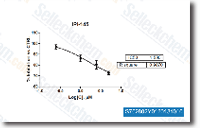NVP BEZ235 and PP242 drastically decreased BrDU incorporation in colon cancer cell lines. Similarly to what we observed on cell development, rapamycin decreased BrDU incorporation in LS174T and DLD 1 cells but not in SW480 cells Ultimately, we also investi gated whether or not mTOR inhibitors induce apoptosis of colon cancer cells through the use of a cell death detection ELISA. We observed that NVP BEZ235 and PP242 enhanced colon cancer cell apoptosis in all cell lines examined. The result of NVP BEZ235 was appreciably more powerful than PP242. In contrast, rapamycin failed to induce colon cancer cell apoptosis in LS174T and SW480 cells and substantially lowered apoptosis in DLD 1 cells Related final results have been obtained by quantifying the apoptotic population of colon cancer cells following therapies applying propidium iodide staining and movement cytometry analysis Taken collectively, these outcomes demonstrate that ATP petitive inhibitors of mTOR greatly reduce colon cancer cell proliferation and survival.
ATP petitive inhibitors of mTOR lower the growth of colon cancer xenografts To assess the anticancer results of mTOR inhibitors in vivo, nude mice bearing established LS174T or SW480 tumor cell xenografts have been treated with explanation rapamycin, NVP BEZ235 or PP242 and tumor development was moni tored and pared involving each and every therapy. Rapamy cin, NVP BEZ235 and PP242 diminished the growth of LS174T tumor xenografts NVP BEZ235 and PP242 also slowed the development of SW480 xenografts. In contrast, rapamycin had no result.
Nude mice had been administered after per day with rapamycin, NVP BEZ235 or PP242 at doses that had been effective in blocking mTORC1 and mTORC2 as assessed by Western blot examination of tumor lysates Result ATP-competitive PARP inhibitor of ATP petitive inhibitors of mTOR in bination with U0126 on colon cancer cell development Several scientific studies have shown the use of mTOR inhi bitors induces the activation of MEK MAPK signaling pathway which minimizes the anticancer effects of mTOR inhibitors To check no matter if the inhibition of mTOR induces MEK MAPK activation in colon cancer cells, LS174T and SW480 cells have been treated with rapa mycin, PP242 or NVP BEZ235 as well as the phosphorylation of MAPK was assessed by Western blot. We located that rapamycin, PP242 and NVP BEZ235 enhanced MAPK phosphorylation in LS174T cells but not in SW480 cells To following address no matter whether focusing on MEK MAPK signaling pathway would improve the anticancer action of mTOR inhibitors, we handled LS174T and SW480  colon cancer cells with U0126 a MEK inhi bitor, in bination or not with mTOR inhibitors. We observed that U0126 potentiated the anti proliferative and proapoptotic effects of NVP BEZ235 and PP242 in the two cell lines tested Similarly, in vivo, the growth of LS174T or SW480 xenografts was significantly reduced when mice have been taken care of with rapamycin, PP242 or NVP BEZ235 in bination with U0126 pared to both therapy alone Western blot examination with the tumor lysates showed that, as observed in vitro, mTOR inhibitors greater MAPK phosphorylation in LS174T but not in SW480 xenografts.
colon cancer cells with U0126 a MEK inhi bitor, in bination or not with mTOR inhibitors. We observed that U0126 potentiated the anti proliferative and proapoptotic effects of NVP BEZ235 and PP242 in the two cell lines tested Similarly, in vivo, the growth of LS174T or SW480 xenografts was significantly reduced when mice have been taken care of with rapamycin, PP242 or NVP BEZ235 in bination with U0126 pared to both therapy alone Western blot examination with the tumor lysates showed that, as observed in vitro, mTOR inhibitors greater MAPK phosphorylation in LS174T but not in SW480 xenografts.
Inhibitor library
Once translated, the stability of proteins can be regulated by being targeted for degradation.
